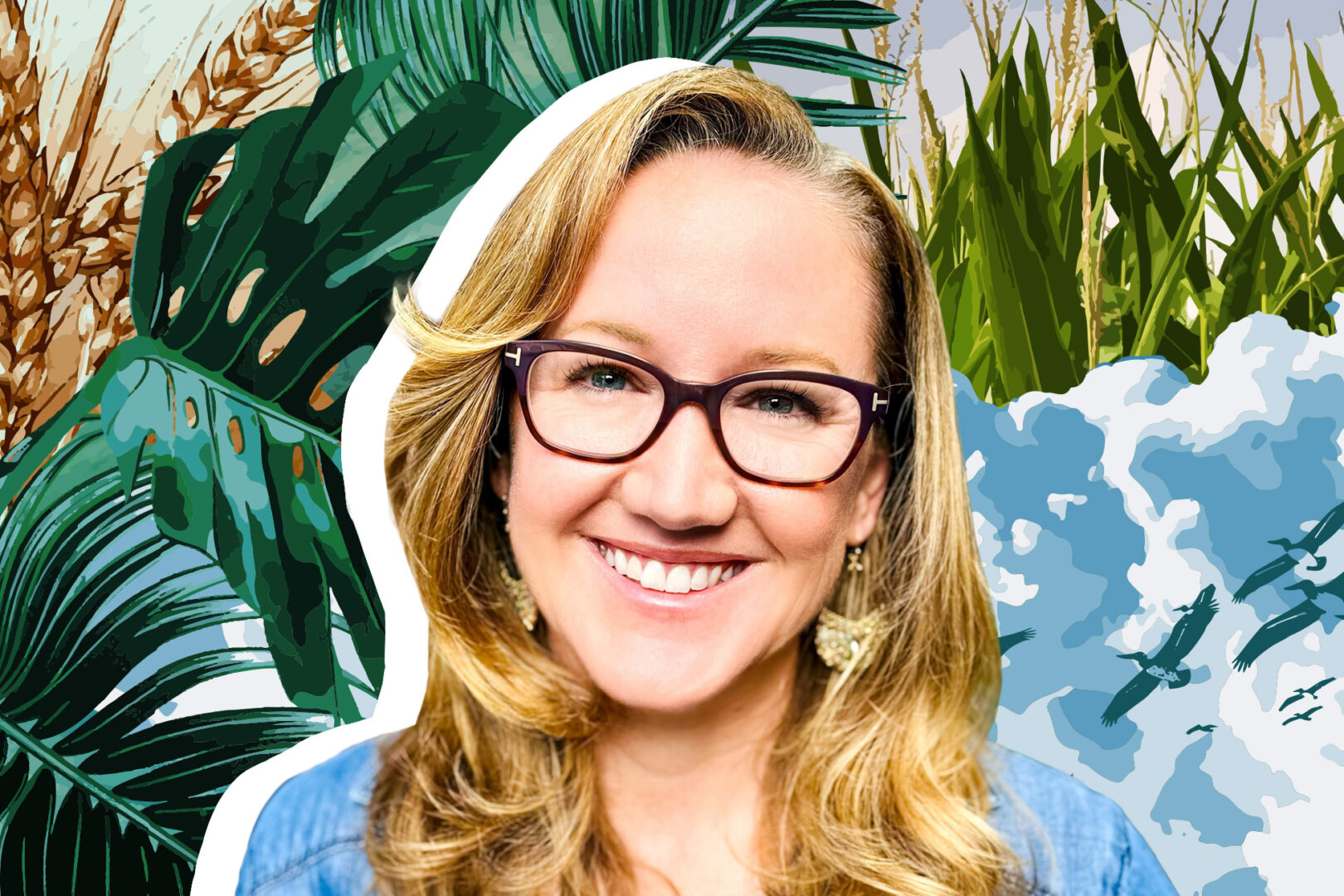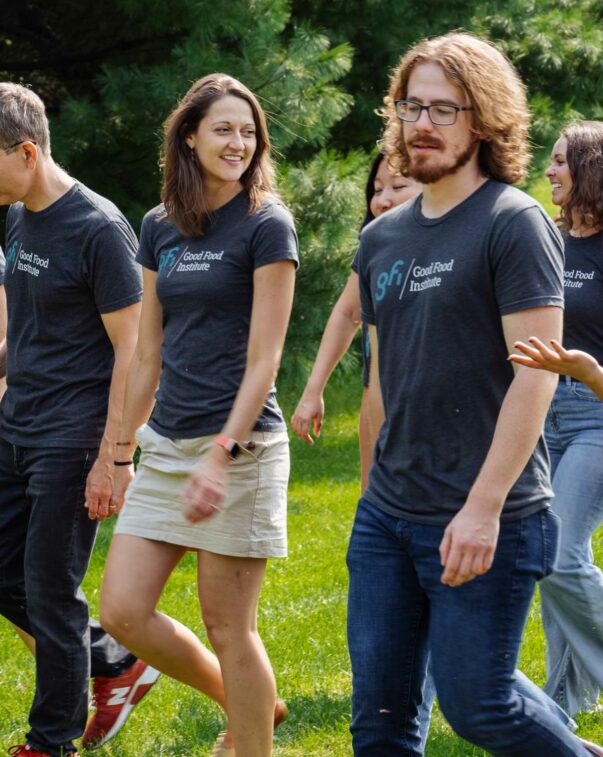Meet our new vice president of science and technology

“If I have seen further it is by standing on the shoulders of giants.”
Isaac Newton
Amanda Hildebrand is a self-proclaimed podcast junkie. One of the many fun facts about her is that she first heard about GFI and our work on alternative proteins on a podcast featuring the very woman whose shoes she would go on to fill several years later: Dr. Liz Specht.
Those shoes set the path for our Science and Technology department, a not-so-small but mighty team of 26 brilliant minds in the alternative protein ecosystem. It’s a big job, and Amanda has already proven she’s up for the task.

Listen to our interview
Given her love of podcasts, I thought it only fitting for you to get to know our new vice president of science and technology through a podcast-style interview. Listen and read along to learn more about Amanda and the work of our SciTech team.
*This text transcript is shortened. For the full conversation, listen above.
Tell us about yourself and your role at GFI.
I’m Amanda Hildebrand. I’m the vice president of science and technology at GFI. I work with the rest of the leadership team to set the strategy and direction for our different groups and how they work together. Drive the different projects that we have forward with our amazing SciTech team and the cross-functional collaboration across GFI, both in the US as well as with our affiliates.
When did you first realize you wanted to use your skills to help build a better food future?
A long time ago, I fell in love with fermentation technology. It’s just this really cool technology that can be used for so many different applications to make better, more sustainable products for the world. These are pharmaceuticals, fuels, foods, you name it. And early in my career, I decided I wanted to center my efforts on climate change. So my PhD and most of my time in industry focused on biofuels, and that was just a really great way for me to blend this passion for fermentation with my drive to tackle climate change. Eventually, I left corporate biotech in favor of the startup space. That had a lot to do with being eager to have a bigger impact on the world and to be more at the forefront of innovation. So it was around that time that I listened to a podcast–I’m a podcast junkie–and it was featuring Dr. Liz Specht and Bruce Friedrich. And that really raised my awareness of these many negative externalities associated with our current system for food production and how alternative proteins offer a solution that dramatically improves the environment, human health, and animal well-being. For me, it was just really cool to realize that this technology that I love could be used to address so many challenges all at once, and that’s just simply not something you see very often–this potential to solve so many big problems and have a hugely positive impact on the world.
From your unique vantage point within the alternative protein ecosystem, how would you describe GFI’s role in creating change for our food system?
Yeah, so it’s funny, because my first role in industrial biotech was in developing fermentation processes to produce enzymes. And for those people who aren’t familiar with enzymes, they’re basically catalysts for chemical reactions, meaning they speed up the reactions that convert one molecule to another molecule. And what’s so cool about them is that they’re essential to life, right? Without them, our biological reactions would just be too slow. And similarly, GFI’s role is to look for ways that we and others can accelerate a transition from the existing protein production system to one that is sustainable, secure and just. And as you might expect, transitioning a massive food system is really complex and challenging. GFI plays many, many roles in this lens of accelerating that transition, right? So from mapping where we are as an industry and where we need to go to identifying challenges along with the most effective solutions, and ultimately mobilizing resources, both internally and across the ecosystem, to address those many challenges. So yeah, we just play many, many roles, but the main thrust there is looking for ways to accelerate the industry as a whole.
What specifically would you say those goals are in accelerating the industry?
I think one of the biggest goals that we have is to drive more public funding into the space, both for open-access research and commercialization. So to date, the large majority of funding has come from the private sector, and what that means is that a lot of the scientific advancements are locked up in IP and trade secrets, and many of those companies spend a significant amount of capital on redundant efforts and vertical integration, right? So this all slows progress of the field as a whole. So one of many approaches that we’re taking to drive more public funding is to highlight the economic opportunity that alternative proteins represent. So alongside the benefits to the environment, public health, food security and animal welfare, the AP industry provides clear economic opportunities in the form of job creation, diversification for farmers, and new markets for economic growth. So we’re continuing to deepen our understanding of these economic benefits, with the goal of incentivizing governments to prioritize alternative proteins at both regional and national levels. And beyond that also position the AP industry to really capitalize on these opportunities. An example there would be our efforts around workforce development. So many types of skills and jobs are required to support this growing industry, and we want to further develop that education and training ecosystem to make sure that we can respond to the rising demand.
I’ve had the pleasure of working with many people on the science and technology team. They are all extremely lovely humans in my experience. Can you give us an example of one thing your team is working on that really excites you?
The SciTech team here is just truly phenomenal. It’s been such a pleasure to get to know them. They just have such depth of expertise and capabilities, and I’m just really lucky to get to work with them. And we have a ton of exciting projects going on, so it’s really hard to pick one, but if there were one to highlight, it’s this road mapping project that we’re calling the technical and adoption readiness framework. So it’s actually a really big cross-functional project, so it includes many, many other people outside of the SciTech team as well. But in essence, it’s a dynamic and interactive tool that can give us both a high-altitude view of the industry as well as a much more granular view. So the goal here is for this tool to help us guide our strategic and tactical plans for advancing the industry, and more specifically, we can use the tool to enrich our understanding of where the biggest bottlenecks are on this path to widespread commercialization of APs, as well as the interdependencies of the different elements of this roadmap and where the highest impact leverage points are. Ultimately, it will allow us to look at the path to commercialization through many different lenses, and I think it’s just going to be this amazing complement to all the other tools we have in our toolkit.
What about in the broader alt protein ecosystem?
All the time. As I mentioned, you know the space needs much more public investment to date, you know, we’ve seen about a billion dollars in government investment. And that sounds like a lot of money, but it’s paltry when we compare it to the about 1 trillion plus dollars that has been invested toward clean energy initiatives. So despite that sort of minimal investment, the progress that we’ve made has been amazing. For example, we’ve seen regulatory approvals of cultivated meat in multiple countries, along with really dramatic decreases in production costs. And these are just two milestones that as of a few years ago, people deemed would be impossible to overcome. So I was listening to a podcast, as usual, and I think Uma Valeti put this really well, and I’m paraphrasing here, but he said, you know, the field has already moved from being impossible to possible, and now we need to go from possible to inevitable. And I just love that framing. And you know, to be clear, I don’t believe this transition is inevitable. As I said, we need much more investment to make the whole endeavor successful. But what I get excited about is that, as a whole, the trend lines are increasingly positive. So we’ve seen an ever-growing ecosystem within both academia and industry. Increased acknowledgment of the necessity of alternative proteins in large forums like COP28. We’ve seen large investments in centers of excellence by the Bezos Earth Fund, and multiple countries are integrating alternative proteins into their bioeconomic strategies. So we just see this continued, huge momentum, and it gives me a lot of optimism and excitement about the future.
I imagine your entire life is not just alt proteins. Is there something someone may not know about you just by looking at your resume or your LinkedIn profile?
Yeah, definitely! LinkedIn is pretty specific to my professional interests, and it does not shed much light on my personal life or other interests. One thing you won’t find on there is one of my friends claiming that I am the golden retriever of humans. As a dog lover, you know, I choose to interpret this as a high compliment, but I know that she meant it as a playful jab. But what I will say is it is somewhat accurate in that, you know, it’s the simple things in life that make me happy. I do love adventures, big and small, but mostly I just love everyday moments with my family. I really love being outdoors in nature, hiking, playing sports, what have you. Live music is always an added bonus. So I seek that out whenever I can. And I just love interesting conversations with good company. Those are the things that make me smile and they give me life and energy. So, pretty simple person when it comes down to it.
I would say golden retriever humans are some of my favorite humans, and I don’t think I’m alone in that.
Yeah, I’m in good company at GFI with that one.
Yes, you are!

Resource
What will shape the future of alternative proteins?
In this video, Dr. Liz Specht reflects on 2024’s achievements and shares her vision for the future of alternative proteins.

